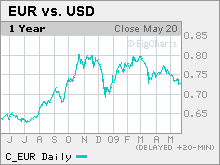Dollar hits 5-month low
The greenback loses value after a negative revision on the U.K.'s outlook makes investors wonder if the U.S. is next. Inflationary fears heat up.
NEW YORK (CNNMoney.com) -- The dollar fell to a five-month low against the euro Friday as inflationary fears heated up and the market continued to fret over a downgrade of the U.K.'s outlook.
The 16-nation euro traded at $1.4008, up 0.8% from late Thursday when it ended at $1.3891.
The British pound cost $1.5911, up 0.4% from Thursday's close of $1.5844.
Meanwhile, the dollar gained against the Japanese yen. The dollar bought ¥94.81, up from ¥94.42 late the previous day. The yen is often considered a safe haven in times of market uncertainty.
On Thursday, ratings agency Standard & Poor's affirmed the United Kingdom's top-tier credit rating, but lowered the country's outlook to "negative" from "stable."
S&P attributed the downward revision was to the possibility that the U.K.'s debt burden could reach 100% of its gross domestic product, despite the British government's "further fiscal tightening."
Given that the U.S. government has been spending at such a rapid pace, investors feared that a similar fate awaited the U.S.
"If the U.K. had the outlook for its credit rating cut from stable to negative, then the U.S. deserves to as well," said Kathy Lien, director of currency research at Global Forex Trading, in a research note.
On Friday, Moody's, another major ratings agency, attempted to assuage market jitters by saying that the U.S. did not face an imminent credit downgrade. But the worries were already firmly planted in investor mindset.
"Both the U.S. and the U.K. are spending money left and right and although the risk of a actual credit rating downgrade anytime time soon is low, it is more than likely that Standard and Poor's is already reviewing the U.S.' sovereign debt rating," said Lien. "Whenever there is uncertainty, investors always sell first and ask questions later."
The shuttering of a major Florida bank also weighed on the dollar. Thursday, BankUnited FSB in Florida, with $12.8 billion in assets, was closed and a consortium of private equity firms took over the failed bank.
"This is the largest bank failure since IndyMac last year and points to ongoing weakness within the U.S. banking system," said Camilla Sutton, currency strategist at Scotia Capital, in a research note.
A modest rally on Wall Street also worked to weaken the greenback. Investors sometimes move assets into the dollar to avoid exposure to other, more risky parts of the marketplace. But with all three major U.S. indexes up on the day, that safe-haven bid eased. ![]()



